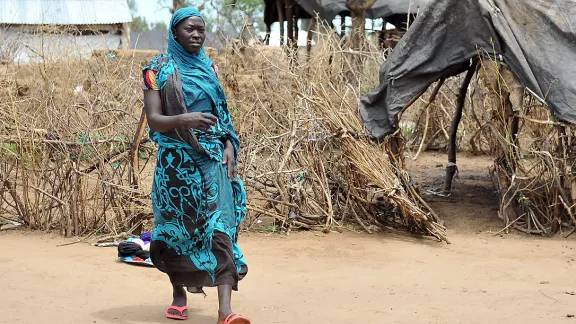
Gisma with her family. Photo: LWF/ C. Kästner
BUNJ, South Sudan/ GENEVA, 16 June 2016 (LWI) – “We, as her family see it as something good, but according to our society, she has rebelled,” Juma Leheme says. He is talking about his niece Gisma, 18 years old, who refused an early marriage to continue school. On occasion of the Day of the African Child, observed in many African countries to promote child rights, the young woman shares her story to support the Lutheran World Federation’s (LWF) campaign to end the harmful practice.
Gisma’s family fled the war in Blue Nile, Sudan, and settled in Gendrassa refugee camp, South Sudan. When she was 13 years old, a man asked to marry her. As it is customary, Gisma was not asked. The family made a contract and started receiving dowry payments. Her mother and uncle however asked her future husband to wait until Gisma was older, and the girl went back to school.
We all were impressed by the courage of Gisma's family to refund the dowry and send her back to school. Gisma is an inspiration.
Booked as infants, married at 13
When Gisma was 15, the man returned and demanded that the marriage to take place. Gisma refused. He threatened to abduct her. Then he made a complaint with police who ruled in favour of him: The family would have to give Gisma away or pay back the dowry.
Early marriage is very common in South Sudan, and is practised in refugee and host communities alike. Most men consider a 14-year-old girl as old enough to marry. “Girls are usually “booked” as infants and often married when they are only 13 or 14 years old,” Julius Tiboa, LWF child protection officer in Maban, says. The dowry paid by the future husband is an integral part of the bargain. Juma Leheme, Gisma’s uncle, says. “This is part of our culture. If the elders agree to a marriage, there is nothing the parents can do. The elders make the decision.”
Child rights clubs in schools
The Lutheran World Federation (LWF) is responsible for education and child protection in the camp. It advocates against the practise and raises awareness with community leaders, teachers, foster care parents, youth and women groups. Posters and radio spots advise against taking girls out of school for marriage. Some of the girls who are victims of early marriage have been put in foster care arrangements within the community for their own protection. Adolescent peers have been trained on child protection concerns in the camps, to share with their peers. This is a slow, but important process in a context of poverty and illiteracy.
Gisma’s family has started to refund the dowry to her suiter. Gisma’s education and maybe a good job for her in the future are one of the family’s biggest hopes. LWF is supporting Gisma’s family since she confided in her head teacher who informed the LWF child protection unit. “As soon as she reported to LWF, a child protection staff went to her family’s house,” Julius Tiboa, LWF child protection officer, says. Gisma’s case was discussed with a child protection panel between aid and government agencies. “LWF has visited Gisma and the family several times to support and encourage her and her family. We discussed with the family how to pay back the dowry. We also talked to Gisma’s teacher so that he can support Gisma and reduce stigma at school,” Tiboa explains. The family also received relief goods to ease the burden on the family budget. “We all were impressed by the courage of Gisma's family to refund the dowry and send her back to school. Gisma is an inspiration.”
“I want to educate and support”
Even now at the age of 18, I do not feel ready for marriage. Maybe when I am 20, or 25 years old,” Gisma says. While she is an exception, she is no longer the only one who refused to marry. Other girls in Maban have started to fight for weddings to be postponed, and for their right to go back to school. Gisma wants to become a teacher. “In our family we are not educated. We have a lot of problems. I want to educate and support them,” she says.


